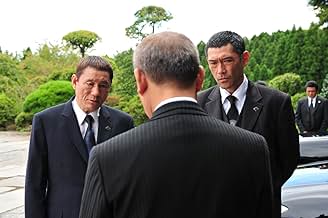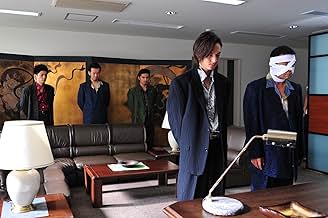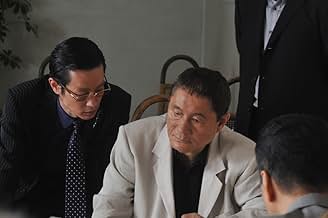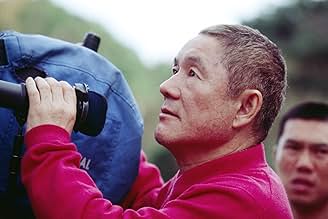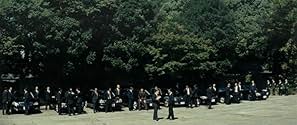O chefe de um clã ordena que seu subordinado bote uma gangue na linha, entre traições e extorsões, nem tudo dá certo.O chefe de um clã ordena que seu subordinado bote uma gangue na linha, entre traições e extorsões, nem tudo dá certo.O chefe de um clã ordena que seu subordinado bote uma gangue na linha, entre traições e extorsões, nem tudo dá certo.
- Prêmios
- 1 indicação no total
- Ôtomo
- (as Beat Takeshi)
Avaliações em destaque
It lacks both the depth and the soul of Coppola's classic gangster film of 1972. Also missing here is Marlon Brando's larger than life Don Corleone; none of the actor's here can come close.
The violence becomes repetitive as do the betrayals which bored me, and the editing seemed haphazard, never developing a coherent flow. The overall production is competent with decent acting but in the end I didn't care what happened to anyone from the chairman down the the many Yakuza soldiers. Everyone is corrupt, including the police, taking bribes to the street criminals looking out for themselves.
Whether you like Takeshi Kitano or not, he sure is good in depicting the yakuza. In the long run this ability got him typecast and he tried to brake the mold in several movies between Brother (2000) and Outrage. For some reason he decided not to pursue his artistic ambition for a while and focus again on Japanese underworld. And this is in no way a step back.
The power struggle between the old boss and his right hand is exquisitely depicted. Without it Outrage would be just another crime thriller with extreme scenes of violence.
There are random acts of extreme violence that continue to propel the plot forward. Kitano, playing the underboss Otomo, is a similar role to his other characters in yakuza movies which portray out of control individuals that have a minor standing yet have the last word at the end of the play. Rather than focusing on the beauty of mobsters hiding out on the beach, this is a gritty, urban drama much in the tradition of Johnnie To's triad movies (Election) that has dominated the organized crime dramas over the past decade.
In showing the criminality of the human mind, it evokes Mario Bava's study in Rabid Dogs, similarly Kitano is building a Brechtian inspired drama about the harsh existential life. Kitano continues to explain and further define his worldview through the character of a doomed nihilist anti-hero. In all of Kitano's yakuza character studies, there is no hope, or redemption, only a further plunge into an ugly existence of lies and deceit, where only an act of violence can bring about change.
As Kitano remarked publicly about his making of Outrage, he is giving the people what they want - no pretense of artistic embellishments, but rather blunt, cruel acts of violence of the professional criminal devoid of any romanticism. One scene in particular evokes The Godfather, but that is where the similarities end - there is nothing glamorous about the yakuza lifestyle.
In this film, Kitano assumes the duties as in his other yakuza films as that of star, director, editor and writer. The vision is completely his own. The pacing is deliberately slow, showing that the life of a criminal is not particularly exciting but rather mundane as that of any other type of businessman, mostly involving allegiances of convenience and acts of betrayal. There is no illumination or redemption here, no course of action will lead to a better life, such is the basic tenet of a nihilist.
There is little flourish in the direction such as to immerse the viewer into the dark, banal existence of its characters. The one scene that brings a sense of relief with sunlight streaming through the trees on a backstreet, is colored darkly by seemingly innocent activity that is actually quite sinister for the individuals involved.
This is a welcome and long overdue return for Kitano to the yakuza genre which he abandoned a decade ago for a trilogy of felliniesque introspective autobiographical films. There are no experimental sequences or absurdist imagery as in his previous films. As a consequence, Kitano is no longer held back with meditative musings, instead giving the viewer an unfiltered take on the corruption, lies, and phony existence of the individual in an artificial society - that any person in any social situation is merely part of an inauthentic social contract.
In many ways, the lack of artistic pretense in Outrage only serves to further embolden the bleak message that Kitano has for us. This is not a film for the weak of heart, nor is it one for the impatient, it is a slow revelation revealing the emptiness of life and the pointlessness of all action.
Typically, the topic of yakuza is often shunned. If ever confronted, it is often used to accentuate comedic elements, whilst leaving the truth of the yakuza world unchallenged. However, director/screenwriter/actor Takeshi Kitano goes against the flow and makes a comeback with this feature film after almost a decade long hiatus. Though this is not as well received as compared to other made in Japan films, it has still received much acclamation. Earlier in his directing career, he was already known for "Violent Cop" and "Sonatine", which also dealt with the dark world of yakuza. It is therefore admirable for his efforts to bring forth the most truthful reflection of the dark side of Japan despite the risk of low commercial success. And for this film, he has once again managed to project a somewhat accurate image of the realities in the yakuza scene.
The overarching plot of the film works with the conflicts that could possibly exist in any relationships – malice and greed. It circles the power struggle between the Iketomo-gumi and its affliation Murase-gumi and his sworn brother Otomo (Takeshi Kitano) who has his own crew as well. While Otomo tries to break free from the subordination of the Murase-gumi, they too try to acquire greater power. In this power struggle, they begin to plot against one another and result in sheer violence and torture. In this aspect, Takeshi is quite creative and playful as he invents numerous ways that the characters get tortured or die. As revealed in one of his interviews, he actually came up with these before he wrote the narrative that parallels with the violence. The convincing gore and never-imagined ways to kill and torture; for this you really have to watch it for yourself.
Takeshi has carefully chosen who to cast for this film. He made a point not to repeat any actors who worked with him in his previous yakuza related works. The cast is pretty commendable for they capture the essence of the characters they are portraying, and even are said to get through each scene with only one or two shots. One of the more outstanding actors is undeniably Ryo Kase, who sports fluent English as opposed to the Japrish/Engrish we often associate Japanese with. That being said, the English dialogues between him and the gaijin (foreigner) were rather blunt and funny. This is probably intentionally designed to poke fun and entertain the viewers.
In the technical aspect, Takeshi displays much competence in his camera- work. From wide-angled shots, to close-ups, to long pans and even point- of-view shots; he utilized a variety of these shots to effectively communicate the non-verbal messages. Put simply, you will find it easier to 'get into the mood' as he engages the viewers very much. Also, hallmark of his films is the seemingly abrupt cuts that often do not signal direct causality in the sequences. As the idiom goes, "one man's meat is another man's poison". You will either hate this style or love this style. Though it can get confusing at times, the overarching plot sets a frame for which the sequences happen. Therefore in its fairly organized manner, it sparks brilliance in its narrative.
Overall the film though unconventional, is a careful examination of the selfish desires that deteriorates relationships. Fitted into the yakuza context, this message has an added punch. On a random note, do look forward to the unanticipated twist towards the end!
- www.moviexclusive.com
The plot revolves around an internal power struggle within an established yakuza family: a fairly standard trope in gangster films in the East and West. Building on this frame Takeshi piles on a number of events, the sequence characterized by the sort of surreally disconnected quality that I associate with his films. It's difficult to follow causality from one event to the next, and in many cases they seem to operate as interesting vignettes loosely connected through the overarching plot. Some are blackly humorous, some are brutally violent, most are characterized by lots of yelling and cursing in the sort of coarse Japanese that's really difficult for non-native speakers to get. Luckily the plot is simple enough to follow, but I do wonder about missing out on some of the finer details...
The characters are filled out only in broad strokes, and most of the standard types are represented: the godfather-like boss, the loyal lieutenant, the conniving underling, the dundering muscle and so on. Takeshi gets generally excellent performances out of the cast, who manage to come off as sincere and spontaneous. He mentioned in a recent television interview that he shoots most of his scenes in only one or two takes, and the film feels fresh. There's some very good talent here, mostly genre actors but good ones. You develop sympathy for a lot of them by the film's end, which is a mark in its favor.
One of the things I really enjoyed about the film was Takeshi's camera-work, which remains sharp and eye-pleasing as ever. He makes effective use of wide-angle close-ups, and does some great riffs off of Coppola in several scenes. Long pans and still shots are also used well. One that really sticks out in my memory from the beginning of the film is a low, outside shot of a line of black cars, just the rear quarter panels, lined up one after the other traveling down the road. It's an odd shot, but serenely beautiful and effective at conveying a sense of the power and menace of the men inside.
On the minus side, the plot really is simplistic and predictable. Not to the extent of boredom, but once you understand the setup it's not at all hard to imagine how things are bound to turn out. Also, I thought the film felt, on the whole, a bit too clean. The cars in every scene are immaculately polished, every actor is decked out in a neatly arranged designer suit, and every set has all of its props in a neatly prescribed arrangement. It presents a somewhat dystopic, but ultimately whitewashed view of yakuza society that would feel retrograde in a Western gangster film.
Overall, it's nice to see a new yakuza film come out of Takeshi's shop, hallmarked with the same sort of black humor, extreme violence and artistic flair that we've come to expect from this perennial festival honoree. I would, however, have liked to see a bit more of how his intervening films might have affected this genre. Outrage is a good yakuza film, but doesn't do much (enough?) to step outside of its element.
Você sabia?
- CuriosidadesFollowing a string of unconventional, commercially unappealing films, Takeshi Kitano engineered this film specifically as commercially appealing, going back to the genre which brought him the most success, and going as far as imagining the death scenes first and writing a story around them later.
- Citações
Ikemoto: H-h-hold on a minute...
[panting]
Ikemoto: I'll reverse the banishment.
Ôtomo: Huh?
Ikemoto: I'll reverse the banishment.
Ôtomo: You banish me, then you reverse it?
[explodes]
Ôtomo: How many fucking tongues do you have?
Ikemoto: Huh?
Ôtomo: Are you deaf? How many do you have?
Ikemoto: I've only got one.
Ôtomo: Only one? *Two* or *three* is more like it, you fucking prick!
Ikemoto: I'm telling you I've only got one tongue!
Ôtomo: [a little calmer] Open your mouth.
[louder]
Ôtomo: Stick out your tongue!
Ikemoto: [beat] Huh?
Ôtomo: [barking] Stick out your tongue!
[Ikemoto reveals reluctantly a bit of his tongue]
Ôtomo: MORE!
[Ikemoto does]
Ôtomo: STICK IT OUT, YOU MOTHERFUCKER!
[Ikemoto sticks out his entire tongue, then Otomo slams his jaw so violently that Ikemoto bites through his own tongue; Otomo then shoots him]
- ConexõesFeatured in Ebert Presents: At the Movies: Episode #2.18 (2011)
Principais escolhas
- How long is Outrage?Fornecido pela Alexa
Detalhes
- Data de lançamento
- País de origem
- Centrais de atendimento oficiais
- Idiomas
- Também conhecido como
- Outrage
- Locações de filme
- Chuo-ku, Tóquio, Japão(Exterior)
- Empresas de produção
- Consulte mais créditos da empresa na IMDbPro
Bilheteria
- Faturamento bruto nos EUA e Canadá
- US$ 44.745
- Fim de semana de estreia nos EUA e Canadá
- US$ 6.518
- 4 de dez. de 2011
- Faturamento bruto mundial
- US$ 8.457.741
- Tempo de duração1 hora 49 minutos
- Cor
- Mixagem de som
- Proporção
- 2.35 : 1
Contribua para esta página





